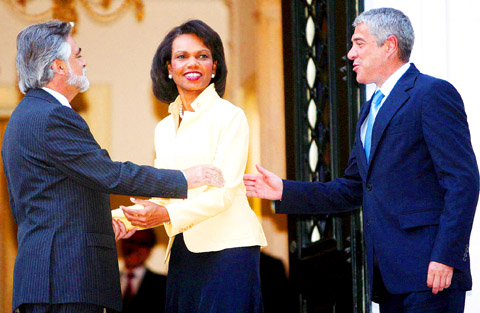When US Secretary of State Condoleezza Rice spends a few hours in Libya and shakes hands with Libyan leader Muammar Qaddafi, she will close a nearly three-decade era of bitter animosity between the US and the North African nation that has sometimes gotten personal.
It’s not every day that a US president calls a foreign leader a “mad dog.”
As the first secretary of state to visit the country in more than a half-century, Rice’s visit yesterday will represent a foreign policy success for the Bush administration.

PHOTO: EPA
“It is a historic moment and it is one that has come after a lot of difficulty, the suffering of many people that will never be forgotten or assuaged, a lot of Americans in particular. It is also the case that this comes out of a historic decision that Libya made to give up weapons of mass destruction and renounce terrorism. I am very much looking forward to it,” Rice said yesterday at a news conference in Lisbon.
“Libya,” she said, “is a place that is changing and I want to discuss how that change is taking place.”
Yet relations between the two countries still will face strains on a number of fronts, ranging from human rights to the final resolution of legal claims from 1980s terror bombings.
Despite Qaddafi’s 2003 decision to abandon weapons of mass destruction, renounce terrorism and compensate victims of the 1986 La Belle disco bombing in Berlin and the 1988 Pan Am 103 bombing over Lockerbie, Scotland, not all questions have been settled.
Even as Rice prepared for her landmark face-to-face meeting with Qaddafi, whom the late president Ronald Reagan once called the “mad dog of the Middle East,” a fund set up last month to compensate US and Libyan victims of those bombings remained empty.
A leading reformer, Fathi al-Jhami, whose case has been championed by the Bush administration, remained in detention, where he has been near continuously since 2002. Rights groups say hundreds of other political prisoners are still being held.
Among the biggest question marks is the often unpredictable behavior of Qaddafi, who has cultivated images as both an Arab potentate and African monarch since taking power in a 1969 coup. By all accounts it will be a meeting to remember.
In an interview with al-Jazeera TV last year, Qaddafi spoke of Rice in most unusual terms, calling her “Leezza” and suggesting that she actually runs the Arab world with which he has had severe differences in the past.
“I support my darling black African woman,” he said. “I admire and am very proud of the way she leans back and gives orders to the Arab leaders ... Leezza, Leezza, Leezza ... I love her very much. I admire her, and I’m proud of her, because she’s a black woman of African origin.”
Rice will be the first secretary of state to visit Libya since John Foster Dulles in 1953 and the highest-ranking US official to visit since then vice president Richard Nixon in 1957.

Drug lord Jose Adolfo Macias Villamar, alias “Fito,” was Ecuador’s most-wanted fugitive before his arrest on Wednesday, more than a year after he escaped prison from where he commanded the country’s leading criminal gang. The former taxi driver turned crime boss became the prime target of law enforcement early last year after escaping from a prison in the southwestern port of Guayaquil. Ecuadoran President Daniel Noboa’s government released “wanted” posters with images of his face and offered US$1 million for information leading to his capture. In a country plagued by crime, members of Fito’s gang, Los Choneros, have responded with violence, using car

Two former Chilean ministers are among four candidates competing this weekend for the presidential nomination of the left ahead of November elections dominated by rising levels of violent crime. More than 15 million voters are eligible to choose today between former minister of labor Jeannette Jara, former minister of the interior Carolina Toha and two members of parliament, Gonzalo Winter and Jaime Mulet, to represent the left against a resurgent right. The primary is open to members of the parties within Chilean President Gabriel Boric’s ruling left-wing coalition and other voters who are not affiliated with specific parties. A recent poll by the

TENSIONS HIGH: For more than half a year, students have organized protests around the country, while the Serbian presaident said they are part of a foreign plot About 140,000 protesters rallied in Belgrade, the largest turnout over the past few months, as student-led demonstrations mount pressure on the populist government to call early elections. The rally was one of the largest in more than half a year student-led actions, which began in November last year after the roof of a train station collapsed in the northern city of Novi Sad, killing 16 people — a tragedy widely blamed on entrenched corruption. On Saturday, a sea of protesters filled Belgrade’s largest square and poured into several surrounding streets. The independent protest monitor Archive of Public Gatherings estimated the

Irish-language rap group Kneecap on Saturday gave an impassioned performance for tens of thousands of fans at the Glastonbury Festival despite criticism by British politicians and a terror charge for one of the trio. Liam Og O hAnnaidh, who performs under the stage name Mo Chara, has been charged under the UK’s Terrorism Act with supporting a proscribed organization for allegedly waving a Hezbollah flag at a concert in London in November last year. The rapper, who was charged under the anglicized version of his name, Liam O’Hanna, is on unconditional bail before a further court hearing in August. “Glastonbury,